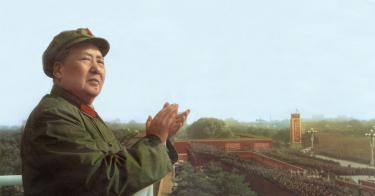Can you name the greatest mass murderer of the 20th century? No, it wasn’t Hitler or Stalin. It was Mao Zedong.
According to the authoritative “Black Book of Communism,” an estimated 65 million Chinese died as a result of Mao’s repeated, merciless attempts to create a new “socialist” China. Anyone who got in his way was done away with—by execution, imprisonment or forced famine.
For Mao, the No. 1 enemy was the intellectual. The so-called Great Helmsman reveled in his blood-letting, boasting, “What’s so unusual about Emperor Shih Huang of the China Dynasty? He had buried alive 460 scholars only, but we have buried alive 46,000 scholars.” Mao was referring to a major “accomplishment” of the Great Cultural Revolution, which from 1966-1976 transformed China into a great House of Fear.
The most inhumane example of Mao’s contempt for human life came when he ordered the collectivization of China’s agriculture under the ironic slogan, the “Great Leap Forward.” A deadly combination of lies about grain production, disastrous farming methods (profitable tea plantations, for example, were turned into rice fields), and misdistribution of food produced the worse famine in human history.
Deaths from hunger reached more than 50 percent in some Chinese villages. The total number of dead from 1959 to 1961 was between 30 million and 40 million—the population of California.
Rounding up enemies
Only five years later, when he sensed that revolutionary fervor in China was waning, Mao proclaimed the Cultural Revolution. Gangs of Red Guards—young men and women between 14 and 21—roamed the cities targeting revisionists and other enemies of the state, especially teachers.
Professors were dressed in grotesque clothes and dunce caps, their faces smeared with ink. They were then forced to get down on all fours and bark like dogs. Some were beaten to death, some even eaten—all for the promulgation of Maoism. A reluctant Mao finally called in the Red Army to put down the marauding Red Guards when they began attacking Communist Party members, but not before 1 million Chinese died.
All the while, Mao kept expanding the laogai, a system of 1,000 forced labor camps throughout China. Harry Wu, who spent 19 years in labor camps, has estimated that from the 1950s through the 1980s, 50 million Chinese passed through the Chinese version of the Soviet gulag. Twenty million died as a result of the primitive living conditions and 14-hour work days.
Such calculated cruelty exemplified his Al Capone philosophy: “Political power grows out of the barrel of a gun.”
And yet Mao Zedong remains the most honored figure in the Chinese Communist Party. At one end of historic Tiananmen Square is Mao’s mausoleum, visited daily by large, respectful crowds. At the other end of the square is a giant portrait of Mao above the entrance to the Forbidden City, the favorite site of visitors, Chinese and foreign.
Repression continues
In the spirit of Mao, China’s present rulers continue to oppress intellectuals and other dissidents such as human-rights activist Liu Xiaobo. He was sentenced last month to 11 years in prison for “inciting subversion of state power.” His offense: signing Charter 08, which calls on the government to respect basic civil and human rights within a democratic framework. .
China presents itself as a vast market for U.S. companies and investors. But some U.S. companies are taking a second look at doing business in a country which considers Mao Zedong its patron saint. Google has said it is reconsidering its operations in China after discovering a sophisticated cyber attack on its e-mail which the government must have initiated or approved.
Google has revealed what many in the Internet world have known for some time—China routinely hacks into U.S. and Western Web sites for national security and other valuable information. Mao would have enthusiastically applauded this intellectual rape.
I wonder: would President Obama be so ready to kowtow to China if in the middle of Beijing there was a mausoleum of Hitler and, hanging from the gate to the Forbidden City, a giant swastika?
First Appeared in Vindy.com



